
Making Homemade Fertilisers For Cannabis Plants
Think of cannabis fertiliser and you'll likely picture tiny bottles of liquid nutrients lining the shelves of your local hydroponics store. But did you know that you can also make your own cannabis fertiliser at home from natural ingredients? Keep reading to learn how.
Like humans, cannabis plants need food to survive and grow. Moreover, the quality of the food they receive impacts the health of cannabis plants in much the same way the quality of your diet impacts your health and development. So, how can you maximise the growth of your weed plants? By providing them with high-quality nutrients, of course!
Many growers opt to feed their cannabis plants store-bought fertiliser, which comes packed with readily available nutrients that are accessible to plants from the minute the fertiliser hits the soil. However, there are other ways to feed your plants, such as using ingredients like kitchen scraps and urine (yep—you read that right). Keep reading to learn all there is to know about making different homemade fertilisers for your cannabis garden.
Why make your own cannabis fertiliser?
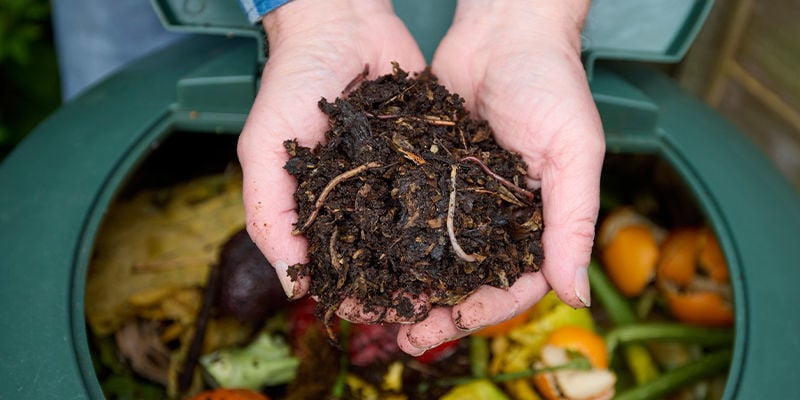
Store-bought cannabis nutrients have a lot going for them: they are easy to use and, when administered properly, can promote fast growth and impressive yields. Packed with nutrients like nitrogen, phosphorus, potassium, calcium, and more, fertilisers are like ready-made meals for your plants. As soon as a fertiliser is administered, your plants can start taking up the nutrients it contains, resulting in fast-tracked growth and bountiful harvests of dense, trichome-laden buds. However, store-bought plant fertilisers also have some pitfalls.
First and foremost, their concentrated nature makes it easy to overfeed your plants, causing nutrient burn and/or lockout, which stresses plants and stunts their growth. Unfortunately, nutrient burn is one of the most common issues facing cannabis growers, especially rookies with good intentions who think that the more they feed their plants, the faster they'll grow.
Moreover, the extensive use of liquid fertilisers can degrade the quality of your soil. While organic nutrients are becoming more popular, many of the fertilisers on the market are inorganic and contain excess salts and other pollutants. Over time, a buildup of these pollutants can alter the structure and pH of your soil, cause salt deposits, and even render previously healthy soil useless and infertile.
The runoff from chemical fertilisers also contains toxic chemicals that can be harmful to the environment—a major concern for eco-conscious home growers and large commercial cultivators. Finally, store-bought fertilisers can be pretty expensive, and the cost can easily add up over a single grow.
Fortunately, organic homemade nutrients offer a viable alternative to most of the cons of store-bought nutrients. First and foremost, they are cheap to make. Second, and most importantly, they allow growers complete control over what their plants consume. The result? A more hands-on, holistic approach to cannabis cultivation that, once you try it, may forever change the way you go about growing weed at home.
Benefits of homemade cannabis fertiliser
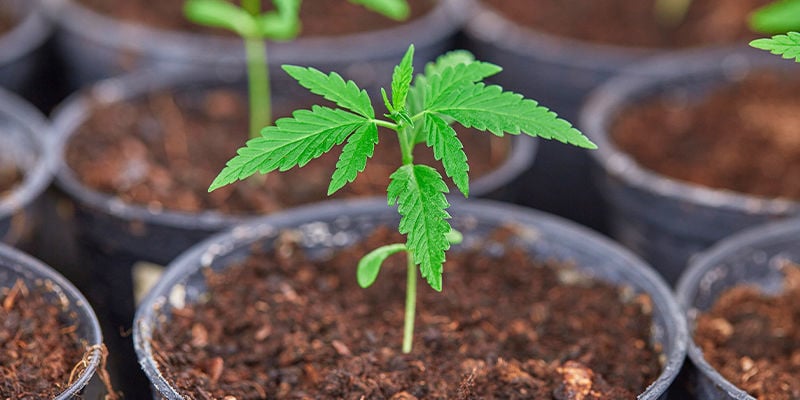
- Inexpensive and easy to make: While it might sound intimidating at first, making your own cannabis fertiliser is easy and can be done with a handful of ingredients (most of which would normally end up in your bin). Moreover, preparing fertiliser in bulk is undoubtedly cheaper than buying liquid fertiliser every time you start a new grow.
- Tailor-made: Once you get the hang of making your own fertiliser, you'll be able to tailor it exactly to the needs/preferences of your plants.
- Minimises the risk of overfeeding: The homemade cannabis fertilisers we'll look at below contain organic ingredients that need to be broken down by the bacteria and fungi naturally present in garden soil. Hence, they provide a slow release of nutrients into the soil, minimising the risk of nutrient burn while maximising the growth of your plants.
- Benefits soil health: Organic homemade fertilisers often benefit the growth of beneficial bacteria and fungi in your soil, helping to enhance and preserve soil health over time.
- No need for flushing: Because homemade fertilisers contain organic plant nutrients and are slow-release, they do not need to be flushed from your medium prior to harvest (unlike inorganic chemical nutes). This removes a time-consuming step from the grow process, simplifying it significantly.
- Better aromas and flavours: Experienced growers who have tried their hand at organic gardening will attest that natural fertilisers like those listed below produce cannabis plants with unbeatable flavour and aroma.
Compost — The #1 homemade fertiliser
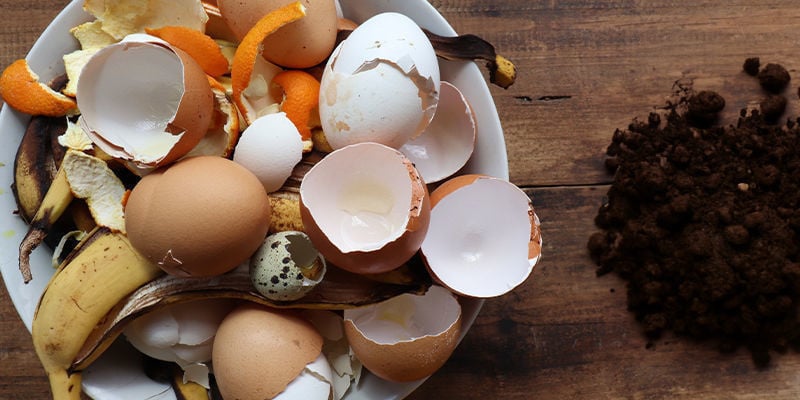
If you're serious about feeding your plants with homemade fertiliser, nothing beats making your own compost. Made by gradually decomposing kitchen scraps and other organic ingredients, compost is the #1 fertiliser for cannabis (and virtually any other plant you're growing at home). Not only does compost contain a full scope of all the nutrients your plants need, but it also promotes the health of your soil and minimises your waste footprint by turning regular house and garden waste into plant fodder—ideal for growers looking for a more holistic and organic approach to cannabis cultivation.
4 ways to make easy homemade cannabis fertiliser
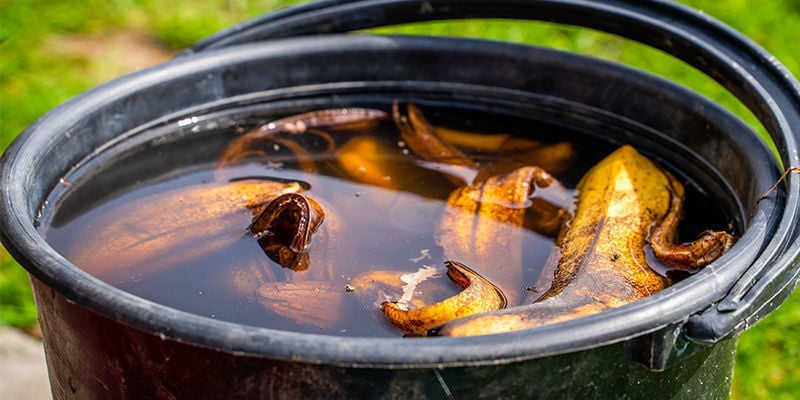
While compost is by far the best homemade fertiliser for weed, it's not the most accessible. Growers living in small spaces, such as city apartments, may not have the space to viably produce enough compost for their cannabis garden. Moreover, composting takes time and patience—something not every grower has. That's where these simple homemade cannabis fertiliser ideas come in; they are super easy to make and, at least to some extent, allow even time-or-space-constrained growers to incorporate natural fertilisers into their cannabis garden.
Note: None of these fertilisers should replace regular feeding with compost or other fertilisers. Instead, think of them as supplements that, when used in moderation, can give your plants a boost while also helping you make the most of the waste produced by your household.
1. Steep food scraps in water to make compost tea
Vegetables are packed with nutrients vital to the health of humans and plants alike. Hence, the next time you're cooking up a storm, consider holding on to your fruit and vegetable scraps along with used tea leaves, coffee grounds, and eggshells. Place the scraps in a large pot or bucket, add enough water to cover the scraps, cover with a lid, and set in the sun for 24–48 hours, stirring once every few hours to aerate the mixture. Voilà—you now have liquid fertiliser, a simple yet effective homemade fertiliser for your plants. Use it sparingly, ideally diluted in 2–4 parts water, and feed it to your plants once or twice a month to avoid attracting bugs into your garden.
For a more nutritious tea, mix 1–2 handfuls of compost, worm castings, and humus in with your vegetable scraps. Not only are these ingredients rich in nutrients, they also contain microbial lifeforms that help feed and protect your plants. If you want to get more involved, brew your own Aerated Compost Tea (ACT) following this recipe.
2. Use aquafaba as a bloom booster
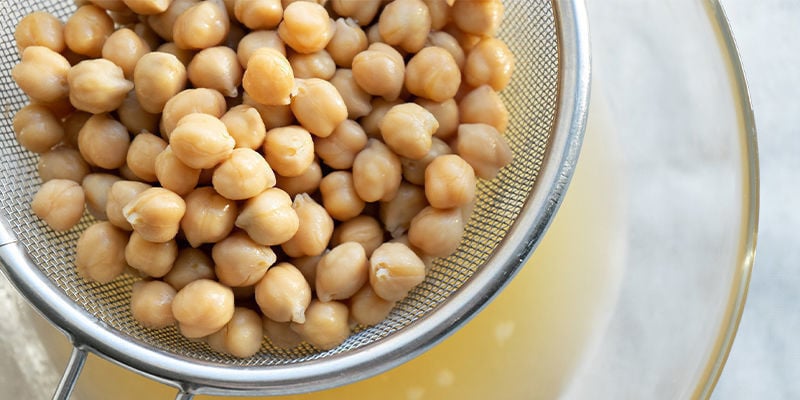
Aquafaba (literally "bean water") is the water found in cooked canned beans, chickpeas, and other legumes. Besides being a popular alternative to egg whites in vegan diets, aquafaba can also be used as a plant fertiliser as it is naturally rich in potassium. If you don't buy canned legumes, you can simply use the water you soak and boil your dried legumes in—just make sure it is unsalted. For the best results, dilute aquafaba in 2–4 parts water and administer to your plants no more than once or twice a month to avoid attracting bugs.
3. Save your urine!
While it might make you cringe, it's true: urine is by far one of the most efficient and easy-to-make homemade fertilisers for cannabis. In fact, it's far more effective than aquafaba or kitchen scrap compost tea, which only contain trace amounts of nutrients. Human urine is packed with nitrogen, and therefore makes a great way to boost your cannabis plants' vegetative growth. Just be sure to dilute it in at least 4–6 parts unchlorinated water, and avoid using it on flowering cannabis plants as they need very little nitrogen. Use it sparingly and on an as-needed basis, as too much nitrogen can be damaging to plants.
Dos and don'ts of making cannabis fertiliser at home
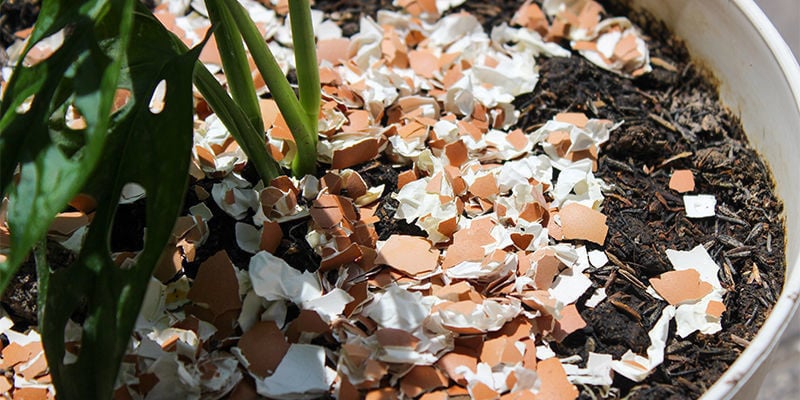
There's no shortage of gardening hacks circulating social media and other parts of the internet. Unfortunately, while some of these hacks work, most of them don't and, furthermore, can actually compromise the health of your plants. Here's a list of dos and don'ts to help you separate the wheat from chaff when making cannabis fertiliser at home.
Do not use kitchen scraps as soil amendments
Countless videos and blogs encourage gardeners to feed their plants by adding kitchen scraps like tea, coffee grounds, and fruit/vegetable peels directly to their topsoil. However, this method is far from effective, and can actually jeopardise the health of your plants.
Organic ingredients like coffee grounds, eggshells, and fruit peels definitely contain nutrients that are beneficial for plants—that's why we add them to compost, after all. However, in order for those nutrients to become available to plants, the organic ingredients in question first need to be broken down by insects and microbial life forms present in soil (such as bacteria and fungi). Most organic ingredients take several months or even years to break down, so simply adding them to your soil will do little for your cannabis plants during their relatively short life cycle.
Moreover, decomposing organic matter attracts insects and pests (such as fruit flies, fungus gnats, ants, and fungi such as Pythium or Botrytis) into your garden, as well as scavenging animals (such as mice, rats, skunks, raccoons, and foxes). Rather than fertilising your plants, adding fruit peels, eggshells, and coffee grounds to the topsoil of your plants is more likely to attract unwanted guests into your garden who'll likely spook you out and compromise your grow. Hence, never add kitchen scraps straight into your soil—throw them in the compost, or use them to make compost tea instead.
Do topdress with organic nutrients like compost and worm castings
Whether you make them yourself or buy them from a garden centre, compost and worm castings are ideal for cannabis. Once you have them, you can use finished compost and worm castings to topdress your plants' soil—not only will this provide them with nutrients, but it'll also introduce beneficial microbes into the soil that help to break down organic nutrients, stimulate root growth, and protect your plants against pathogens and pests.
Use compost teas, aquafaba, and urine sparingly
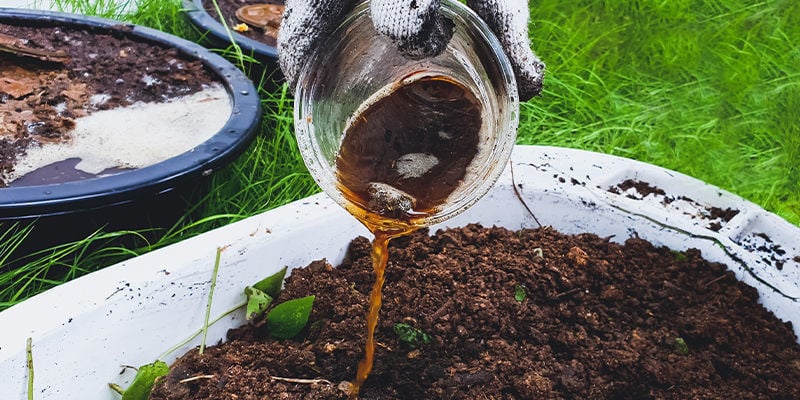
Urine is packed with nitrogen and should only be used to fertilise your plants very sparingly. Meanwhile, aquafaba and kitchen scrap compost tea are much lighter in nutrients but may contain traces of food that, when used in excess, can attract bugs and rodents into your grow space. Hence, it's best to use these types of homemade fertilisers sparingly and complement them with the use of compost and worm castings.
Take the time to properly understand cannabis nutrients
Nitrogen, phosphorus, and potassium are often thought of as the cornerstone of plant nutrients. And while they are key to the growth of healthy plants, cannabis benefits from a balanced diet of both macro- and micronutrients, including calcium, magnesium, manganese, molybdenum, iron, boron, nickel, zinc, and more.
Start using homemade fertiliser today
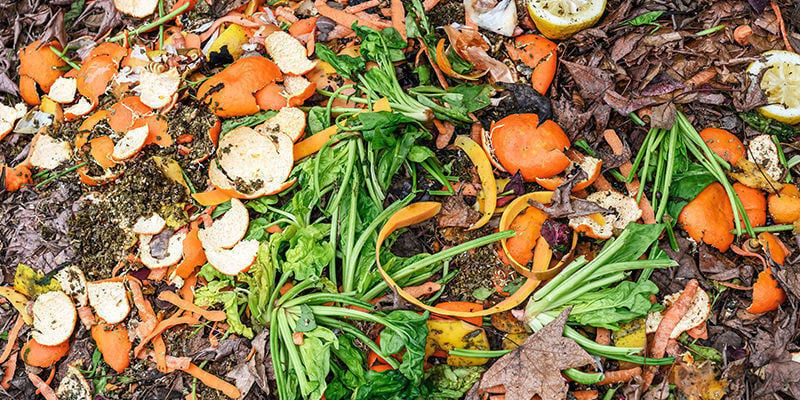
Fertilising cannabis is essential to growing healthy plants. And while store-bought cannabis fertilisers work, homemade nutrients can help you reutilise some of the waste produced by your household and simultaneously benefit soil health and improve the quality of the resulting buds. If you're up for an experiment, try your hand at making compost or the other homemade fertilisers we looked at above. Alternatively, get top-shelf cannabis nutrients from Zamnesia today for a streamlined grow and great harvests.
-
 5 min
17 July 2023
What Are The Best Cannabis Fertilisers?
Besides good-quality soil, fertiliser is essential to maximising the yields of your cannabis plants. The wide array of organic and chemical fertilisers available is extensive, and there are many...
5 min
17 July 2023
What Are The Best Cannabis Fertilisers?
Besides good-quality soil, fertiliser is essential to maximising the yields of your cannabis plants. The wide array of organic and chemical fertilisers available is extensive, and there are many...
-
 6 min
1 April 2021
How To Make The Best Soil Mix For Growing Cannabis
Cannabis plants depend on soil rich in nutrients and beneficial microbes. Discover how to make the perfect soil mix below. Your plants will thank you!
6 min
1 April 2021
How To Make The Best Soil Mix For Growing Cannabis
Cannabis plants depend on soil rich in nutrients and beneficial microbes. Discover how to make the perfect soil mix below. Your plants will thank you!
-
 4 min
10 August 2020
How To Make Your Own Compost For Growing Cannabis
Composting enables cannabis growers to create their own nutrient-rich soil amendment for free. Not only will doing so lower your carbon footprint, but it will bring the health of your garden—and...
4 min
10 August 2020
How To Make Your Own Compost For Growing Cannabis
Composting enables cannabis growers to create their own nutrient-rich soil amendment for free. Not only will doing so lower your carbon footprint, but it will bring the health of your garden—and...
-
 4 min
31 December 2018
What's The Difference: Synthetic Vs. Natural Fertilizer
Synthetic vs organic fertiliser is a heavily debated topic when it comes to growing cannabis. So let’s take a look at the advantages and disadvantages of each.
4 min
31 December 2018
What's The Difference: Synthetic Vs. Natural Fertilizer
Synthetic vs organic fertiliser is a heavily debated topic when it comes to growing cannabis. So let’s take a look at the advantages and disadvantages of each.












 United States
United States










